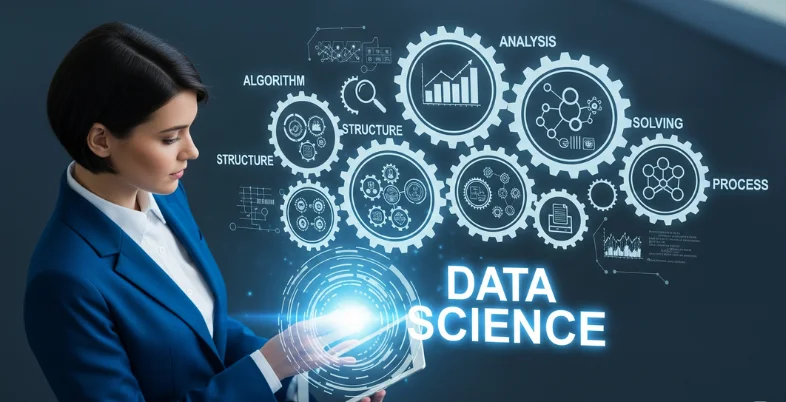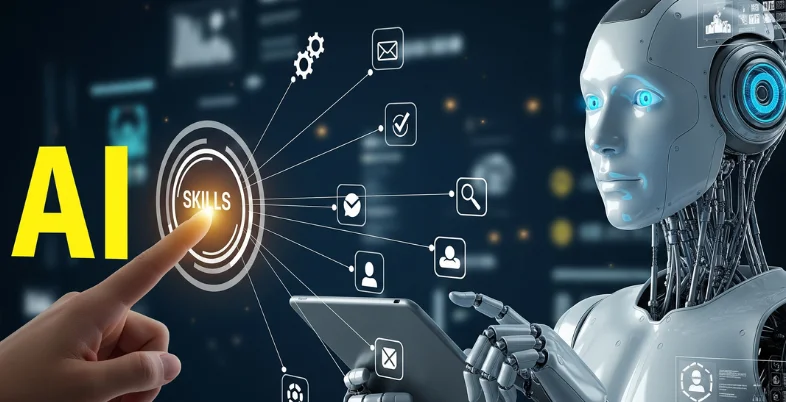As industries worldwide incorporate artificial intelligence (AI) technologies into their operations, there is a growing demand for professionals with AI development skills. Nowadays, possessing AI skills is essential for career advancement in various industries and fields.
A combination of soft and technical skills is now required for AI certifications. As artificial intelligence (AI) tools, such as machine learning, natural language processing, and data analysis, continue to develop and evolve, mastery of these tools is quickly becoming the norm for gaining and maintaining a competitive edge.
Ability to Evaluate the Business Impact of AI
According to a PwC analysis, AI could boost the global economy by $15.7 trillion by 2030 and increase GDP by about 26% in many nations. There are two reasons for this: rising consumer demand and increased productivity.
According to Skillsoft’s IT Skills and Salary Report, AI remains the top investment priority for IT decision-makers. Nonetheless, 65% of them claim that their teams lack a critical skill set.
This indicates that companies of all sizes highly value individuals with AI development skills, as they are in high demand across industries. However, what particular skills are we discussing here? Let’s begin.
List of Top 6 AI Development Skills That Are Valuable to Learn
A combination of technical know-how, analytical abilities, and ethical awareness makes up AI skills. We can create AI systems, work with AI tools efficiently, and take advantage of the opportunities and challenges that AI brings, thanks to these abilities.
1. Programming

The foundation of AI development is programming; with these skills, developers can write, comprehend, and debug code to create software, automate processes, and solve computational issues.
Python is especially well-liked because of its ease of use and the wide range of AI and machine learning libraries that are available, including NumPy, pandas, and TensorFlow.
For example, developers use TensorFlow to build and train deep learning models for image recognition and natural language processing. R is perfect for examining trends in datasets because it can also be used for statistical analysis and data visualization. Java is frequently used in large-scale systems, like creating chatbots with AI capabilities or incorporating AI into enterprise-level applications.
Programming is Necessary for many AI-Based Jobs, Including:
- Engineer in machine learning
- Developer of algorithms
- Engineer in computer vision
- Engineer for SLAM
2. Machine Learning
Despite their frequent interchangeability, artificial intelligence and machine learning are not synonymous. As the name suggests, artificial intelligence (AI) is designed to mimic human thought processes. Humans can also reason, learn, and assess. In order to develop AI systems that are capable of carrying out some of our human tasks, machine learning leverages data analysis, or algorithms.
Let’s take an example where you tell your friend that you enjoy K-pop. This is how they suggest BTS, the South Korean phenomenon that is all over the world. And why? After learning about your preferences for K-pop music, they assumed you would enjoy BTS, but who doesn’t? In this situation, you might think about your friends who use machine learning to compose music recommendations automatically, such as Spotify or Apple Music. Specifically, artificial intelligence and machine learning are not synonymous. AI employs machine learning instead.
The Following are the Most Widely Used Machine Learning Frameworks that you can Learn to Improve your AI Skills:
- Keras
- TensorFlow
- PyTorch
3. Data Science

The study of data for information organization, analysis, and interpretation is known as data science. Acquisition (gathering data), warehousing (keeping data), mining (processing data), exploration and confirmation (analyzing data), and reporting (sharing data) are all parts of this cycle. Data science and data analysis are among the most important competencies needed by AI engineers because they demonstrate to potential employers your ability to interpret vast amounts of data.
Algorithms are used by AI-powered tools, applications, and machines to perform various tasks. And they can only accomplish these tasks by using vast amounts of data to identify common patterns of association. Data science expertise can be used to evaluate data and develop algorithms that companies and AI systems can utilize to train their systems.
Some Skills, Frameworks, and Technologies You’ll Want to Learn to Work with Large Quantities of Data Include:
- Mathematical skills, including linear algebra, linear regression, and statistics
- Big data technologies like Apache Spark and Hadoop
- Speech recognition, natural language processing, and deep learning
- Working with APIs
4. Neural Networks
Can a computer be trained to think like a human? Employers will be swooning over this additional AI skill if you can. An AI framework called neural networks teaches machines to mimic the way the human brain learns and thinks. Although the definition is straightforward, a lot of work went into it. Let’s use handwriting recognition as an example rather than getting too technical with terms like perceptrons, inputs, outputs, and biases.
Consider using the iPad’s “handwriting to text” feature while writing. You start out using print and then quickly move to cursive. Additionally, the technology is still able to recognize what you’re writing, even with the switch from print to cursive. How? To help the system learn more about handwriting, the AI engineer probably used hundreds, if not millions, of training examples when creating the neural network.
The system improves the accuracy of your iPad’s letter, number, and symbol recognition by incorporating these examples.
5. Mathematics and Statistics

Understanding how algorithms function, particularly in neural networks, requires a solid foundation in linear algebra and calculus.
For instance, a lot of math is required to train AI models. Calculus aids in modifying the weights and biases of the model to improve prediction accuracy. Statistics and probability are used to assess the effectiveness of the model and identify patterns in the data. This involves assessing factors like prediction accuracy and balance.
For instance, mathematical reasoning is needed to comprehend gradient descent or activation functions when working with neural networks. Similar to this, statistical expertise aids in assessing model performance, identifying bias, and enhancing accuracy.
Why it Matters to Businesses:
- Developers can improve models
- Identify inefficiencies
- Optimize algorithms by knowing the math underlying the machine.
Also Read: All SMO Tools
6. Deep Learning
Deep learning is the industry standard in fields like speech recognition, computer vision, and natural language processing (NLP). Neural networks and sophisticated AI systems are frequently constructed using frameworks like TensorFlow, Keras, and PyTorch.
Important Ideas Include:
- CNNs, or convolutional neural networks
- Neural networks that recur (RNNs)
- Attention mechanisms and transformers
- Adversarial Generative Networks (GANs)
Why it’s important to businesses: Deep learning is the foundation of innovative technologies like ChatGPT, self-driving cars, and facial recognition; experts in this field are in great demand.
Final Thoughts
Demand for qualified workers will only increase as AI continues to transform industries. But completing a list of tools isn’t enough to get a job at a prestigious tech company. It entails continuous learning, creative production, and critical thinking.
Start with the fundamentals—programming, math, and machine learning—and work your way up to deep learning, deployment, and domain expertise, whether you’re a student investigating AI or a developer making the switch. You’ll be well on your way to becoming the AI specialist that every tech company is looking for if you combine those AI development skills with effective communication and a strong desire to learn.
FAQs
1. What Programming Languages are Most Important for AI Development?
Python is the most widely used language due to its simplicity and powerful libraries like TensorFlow, Keras, and PyTorch. R, Java, and C++ are also valuable, depending on the AI application.
2. Do I Need a Degree to Develop AI Skills?
Not necessarily. While a degree in computer science, data science, or a related field is helpful, many developers gain AI skills through online courses, bootcamps, certifications, and hands-on projects.
3. How Much Time Does it Take to Learn How to Construct AI?
It depends on your background. For beginners, building a strong foundation in programming, math, and machine learning can take 6–12 months. Advanced AI topics like deep learning may take additional time.
4. Is Machine Learning the Same as Artificial Intelligence?
No. Machine learning is a subset of AI. AI is the broader concept of creating machines that simulate human intelligence, while machine learning focuses on systems that learn from data without explicit programming.
5. What Industries are Hiring AI Developers the Most?
AI developers are in high demand in sectors like healthcare, finance, e-commerce, automotive, cybersecurity, and tech startups. Companies use AI for automation, data analysis, predictive modeling, and customer experiences.





